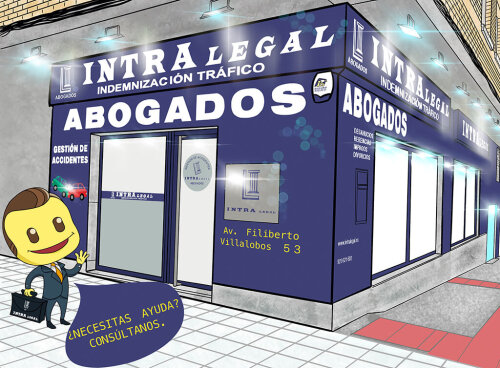Best Commercial Real Estate Lawyers in Salamanca
Share your needs with us, get contacted by law firms.
Free. Takes 2 min.
Free Guide to Hiring a Real Estate Lawyer
List of the best lawyers in Salamanca, Spain
About Commercial Real Estate Law in Salamanca, Spain
Commercial Real Estate law in Salamanca, Spain governs the buying, selling, leasing, and development of properties that are intended for business use. Salamanca, a historic city in Castilla y León, features a blend of traditional and modern business hubs, often within protected or historic buildings. Commercial Real Estate here includes office spaces, retail outlets, warehouses, hotels, and industrial properties. The legal framework is shaped by national legislation, regional decrees, and local urban planning regulations. Participants in Commercial Real Estate transactions must comply with a combination of Spanish property laws and municipal ordinances unique to Salamanca's heritage and city planning characteristics.
Why You May Need a Lawyer
Navigating the Commercial Real Estate landscape in Salamanca can be complex, particularly due to local specificities and Spain's layered legal system. You may need a lawyer in the following situations:
- Purchasing, selling, or leasing commercial property and ensuring that contracts are valid and enforceable
- Negotiating and drafting commercial leases, which often involve unique terms for different industries or protected buildings
- Conducting legal due diligence to uncover encumbrances, pending debts, or urban planning restrictions
- Managing property disputes, such as those related to boundaries, tenant evictions, or breach of contract
- Navigating the licensing and permitting process, especially for properties in protected heritage areas
- Assisting with property developments, changes of use, or construction projects requiring town hall approval
A lawyer ensures compliance, reduces risks, and helps resolve disputes effectively.
Local Laws Overview
The legal environment for Commercial Real Estate in Salamanca is defined by several key laws and regulations:
- Spanish Civil Code and Urban Leases Act (Ley de Arrendamientos Urbanos): These set the framework for property ownership, transfer, and leasing. Commercial leases have more contractual freedom than residential ones but must comply with agreed terms.
- Regional and Municipal Urban Planning: Salamanca's town hall enforces urban plans (Plan General de Ordenación Urbana) that dictate what businesses can operate in specific areas and impose preservation rules on historic properties.
- Heritage Protections: In Salamanca, many buildings require special permissions for alterations due to their cultural or historic value.
- Licensing and Permits: Opening a business often requires an opening license (licencia de apertura) and a building permit (licencia de obra) if renovations are needed.
- Property Registries: All real estate transactions must be registered with the Spanish Property Registry (Registro de la Propiedad) to be legally recognized.
- Tax Obligations: Buyers and tenants may face taxes such as VAT (IVA), Transfer Tax, or Stamp Duty, depending on the specifics of the transaction.
Understanding these regulations is essential before entering into any agreement concerning Commercial Real Estate in Salamanca.
Frequently Asked Questions
What should I consider before buying commercial property in Salamanca?
Investigate property titles, zoning restrictions, outstanding debts, historic protections, and ensure all necessary licenses and permits are in place. Consulting a lawyer can help you avoid future legal and financial problems.
How does a commercial lease differ from a residential lease in Spain?
Commercial leases offer more freedom for negotiation. Duration, rent increases, maintenance, and termination clauses are largely defined by contract rather than strict legal requirements, which means careful drafting is essential.
Do I need a local lawyer if I am a foreign investor?
Yes, a local lawyer ensures compliance with Spanish and Salamanca-specific laws, assists with language barriers, and manages due diligence on your behalf.
What taxes are involved in buying commercial property in Salamanca?
Depending on the seller's status, you may pay VAT (IVA) or Property Transfer Tax. Additional fees include Stamp Duty, Notary, and registration costs.
Is it necessary to register the purchase of a commercial property?
Registration at the Registro de la Propiedad is required to secure ownership rights, protect your investment, and enable future sales or financing.
Can I change the use of a property from residential to commercial (or vice versa)?
Possible but subject to municipal approval, zoning plans, and the building's status. Approval may be more complicated for protected or historic properties.
What happens if there is a dispute with a tenant or landlord?
Spanish law offers mechanisms for mediation, arbitration, or litigation. A lawyer can advise on the best course of action and represent you in negotiations or court.
Are there any restrictions on foreign ownership of commercial real estate in Salamanca?
Generally, foreign individuals and companies can own property in Spain, including Salamanca, though reporting requirements and anti-money laundering checks apply.
Do I need special permits to renovate a commercial property?
Yes, almost all renovations require approval from the local council. Additional permits are required for works on historic or listed buildings.
How long does it take to complete a commercial real estate transaction?
Depending on due diligence, paperwork, and municipal procedures, transactions can take from a few weeks to several months. Complexity increases for properties with pending licenses or historic protection.
Additional Resources
Several institutions and organizations can provide guidance and support regarding Commercial Real Estate in Salamanca:
- Ayuntamiento de Salamanca (Salamanca Town Hall): Handles local zoning, licenses, and urban planning matters
- Registro de la Propiedad (Property Registry): For property title verification and registration
- Oficina Liquidadora: Local office where property transfer taxes are processed
- Official Colleges of Lawyers and Architects: Useful for finding qualified legal or technical assistance on real estate projects
- Chamber of Commerce of Salamanca: Supports business-related property transactions and offers networking opportunities
Consulting these resources can help you research and better understand your rights and obligations.
Next Steps
If you require legal assistance in Commercial Real Estate matters in Salamanca:
- Gather all relevant documents, such as property deeds, contracts, and licenses
- Make a list of your questions and objectives for the transaction or issue
- Consult a lawyer with experience in Salamanca's Commercial Real Estate market
- Seek a meeting or initial consultation to discuss your situation and clarify the best legal strategy
- Follow your lawyer's guidance on due diligence, documentation, negotiations, and registration
Legal support is critical in ensuring your commercial real estate interests in Salamanca are protected and compliant with all local regulations. Professional advice reduces risks and can save you significant time and resources in both immediate and long-term scenarios.
Lawzana helps you find the best lawyers and law firms in Salamanca through a curated and pre-screened list of qualified legal professionals. Our platform offers rankings and detailed profiles of attorneys and law firms, allowing you to compare based on practice areas, including Commercial Real Estate, experience, and client feedback.
Each profile includes a description of the firm's areas of practice, client reviews, team members and partners, year of establishment, spoken languages, office locations, contact information, social media presence, and any published articles or resources. Most firms on our platform speak English and are experienced in both local and international legal matters.
Get a quote from top-rated law firms in Salamanca, Spain — quickly, securely, and without unnecessary hassle.
Disclaimer:
The information provided on this page is for general informational purposes only and does not constitute legal advice. While we strive to ensure the accuracy and relevance of the content, legal information may change over time, and interpretations of the law can vary. You should always consult with a qualified legal professional for advice specific to your situation.
We disclaim all liability for actions taken or not taken based on the content of this page. If you believe any information is incorrect or outdated, please contact us, and we will review and update it where appropriate.










